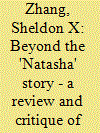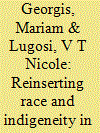|
|
|
Sort Order |
|
|
|
Items / Page
|
|
|
|
|
|
|
| Srl | Item |
| 1 |
ID:
089961


|
|
|
|
|
| Publication |
2009.
|
| Summary/Abstract |
A review of literature on sex trafficking since 2000 reveals that numerous articles have been published in scholarly journals but few are based on systematic primary data collection. Much of our current knowledge, including statistical estimates and characteristics of the trafficking business, derives from a handful reports issued by government and non-government agencies. With few empirical studies available, imagination seems to have filled the gaps of our knowledge. The problem was further complicated by a manifest (sometimes subtle) moral crusading agenda aimed at a deep-rooted and hotly debated social practice.
Also noticeable in the literature is an increasing number of authors who have begun to challenge the empirical premises claimed by these published reports. These sceptical authors find that many articles of questionable quality have been published in peer-reviewed journals, and claim that the current discourse on human trafficking is driven by mythology rather than empirical research.
Rather than dwelling on gaps in our knowledge or concerns over the moral overtone in academic research, this paper seeks to raise specific research questions and explore possible field strategies that can advance our knowledge on this topic. Regardless of one's moral compass, the future of research on sex trafficking cannot become credible without a solid empirical foundation.
|
|
|
|
|
|
|
|
|
|
|
|
|
|
|
|
| 2 |
ID:
098352


|
|
|
|
|
| Publication |
2010.
|
| Summary/Abstract |
The underground sex industry in Turkey has increasingly become dependent on the foreign women, predominantly coming from the former Soviet Union. Some of these women became victims of sex trafficking. However, little is known about how they are recruited, transferred to, and exploited in Turkey. This article attempts to enlighten this process and makes use of police-recorded victim interviews (N = 430), as well as key personnel interviews (N= 18) as primary data. Various methods and tactics are found to be used in sex trafficking operations in Turkey. Most victims are recruited by persons known to them proposing attractive job possibilities, especially in the entertainment business. The majority of victims enter Turkey with legal documents and with various transportation means. Traffickers obtain girls and sell them to customers in public and private settings using methods to control the victims, such as debt bondage, violence, confinement, confiscation of travel documents, and threats.
|
|
|
|
|
|
|
|
|
|
|
|
|
|
|
|
| 3 |
ID:
087812


|
|
|
| 4 |
ID:
127897


|
|
|
|
|
| Publication |
2014.
|
| Summary/Abstract |
The common narrative of how International Relations (IR) has evolved is based on a chronological linear view of continual progress. This story divides the history of the discipline into phases punctuated by the three Great Debates. However, the analytical categories of race and indigeneity have been missing from all these debates; these erasures in the stories of IR are made possible through a series of ontological and epistemological manoeuvres. These in turn, structure a 'common sense' of what the boundaries of IR are, or what they should be. This is evident in the exclusion of what can be seen as major international security issues, which are largely ignored by the discipline. This paper employs an IR post-colonial perspective, using the example of sex trafficking in Canada and the US to demonstrate how the field of IR remains silent on its colonial legacy, with the wider aim of thinking about the implications that omission has for the discipline.
|
|
|
|
|
|
|
|
|
|
|
|
|
|
|
|
| 5 |
ID:
109857


|
|
|
|
|
| Publication |
2012.
|
| Summary/Abstract |
Much has been written in the English-speaking world on the topic of sex trafficking, but little is known about what researchers elsewhere have produced on this topic. An exhaustive literature search was conducted to locate publications on this topic from Latin America. A total of 74 publications were located and put through a systematic content analysis. Four main discernible patterns were noticed: (1) the vast majority of the publications were produced by individuals affiliated with international or non-government organisations; (2) the production of trafficking-related literature sharply declined after 2007; (3) of the small number of studies involving empirical data, most were qualitative in nature; and (4) the literature was primarily focused on the sexual exploitation of children. The discourse on sex trafficking in Latin America appeared to be dominated by advocacy groups. There were few scholarly articles, suggesting limited attention from the academic community. Despite limited empirical data, many Spanish-speaking authors made claims on the nature and extent of sex trafficking, with articles citing one another as source of evidence. This review finds a great need for the involvement of the academic community and for dispassionate and empirically grounded research on sex trafficking.
|
|
|
|
|
|
|
|
|
|
|
|
|
|
|
|
| 6 |
ID:
161435


|
|
|
|
|
| Summary/Abstract |
U.N. peacekeeping missions succeed in preventing the resumption of conflict and saving lives. At the same time, a series of sexual exploitation and abuse scandals since the early 2000s has raised concerns about the conduct of peacekeepers. We examine a related, but generally overlooked, potential negative externality of peacekeeping missions: the forced trafficking of sex workers. We argue that U.N. peacekeepers increase demand for sex work and that this demand may be met through human trafficking for forced prostitution. Using data on U.N. peacekeeping missions between 2001 and 2011, we evaluate the effect of a peacekeeper presence on human sex trafficking in and around the host state. We find that the presence of U.N. peacekeeping forces correlates positively with a state being cited as a destination for forced prostitution. This has important implications for the future deployment of peacekeeping forces around the world.
|
|
|
|
|
|
|
|
|
|
|
|
|
|
|
|
|
|
|
|
|